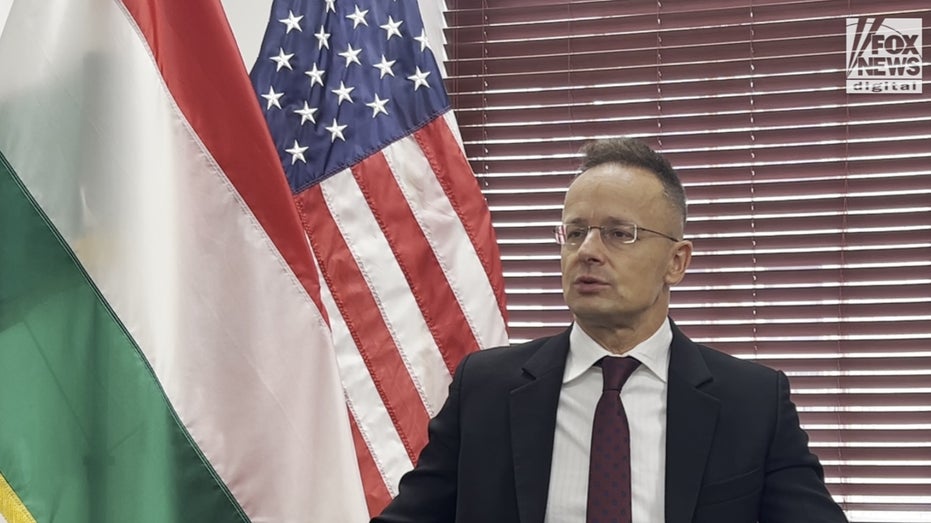
Former President Donald Trump and Hungarian Prime Minister Viktor Orbán have made no secret of their mutual admiration, which led Orbán to leave a NATO summit in Washington, D.C., to meet with Trump.
UNITED NATIONS, New York — Hungarian Foreign Minister Peter Szijjártó revealed in an interview with Fox News Digital that former President Trump alone is his country’s “hope” for helping bring stability to a fraught and increasingly chaotic international security landscape.
“We do believe that actually the game changer here can be the U.S. presidential election, in case President Trump wins,” Szijjártó said, referring specifically to the Russian invasion of Ukraine. “Because knowing Trump, I think it’s absolutely possible — absolutely likely — that with two phone calls he can end this conflict.”
“No one else can do so,” he insisted. “I think only President Trump has the hope and our hope is all in President Trump to do this.”
When pressed on whether that could be understood as a preference for a second Trump administration, Szijjártó insisted, “We are not Americans, so we cannot say we prefer this or that.”
EL SALVADOR’S BUKELE SLAMS CENSORSHIP AS HE TOUTS HIS COUNTRY’S TURNAROUND: ‘WE HAVE FREED MILLIONS’
“What we can definitely say is the following: Politics is based on experience, and we have a clear experience about the term of President Trump in office, and we have clear experience from the terms when the Democrats were there,” he said.
“From the aspect of the U.S.-Hungary relations and from the aspect of the global security situation, when it comes to the U.S.-Hungary relations, it’s obvious that during [the term of] President Trump, these relations have been on the top — best ever,” Szijjártó added.
Trump and Hungarian Prime Minister Viktor Orbán have done little to hide their rosy friendship, with Trump invoking the Hungarian leader as a “strong man of Europe” who speaks well of the former president.
DANNY DANON: UN ABDICATES ROLE OF MIDDLE EAST PEACEMAKER BY BACKING TERRORISTS
Orbán proved this is a mutual dynamic when he chose to leave the NATO summit in Washington, D.C., earlier this year to instead meet with Trump in Mar-a-Lago in Florida to discuss foreign relations.
“Under President Trump, everything was under control,” Szijjártó said. “Since President Trump has left office, the whole global security situation is deteriorating, so, I mean, these are experiences.”
“If we base it on our experience, we say yes, from a perspective of U.S.-Hungary relations, I think President Trump would bring another impetus, freshness, dynamism to this relationship, and I think if President Trump is elected, I think the world has a good chance to become a more peaceful place compared to the current situation.” he said.
Szijjártó argued that “if you look at an administration which is led by a president and vice president, and we didn’t hear too much initiatives from the vice president… means to me that the vice president was part of the structure 100%.” He noted that this comment came from a personal opinion “based on logic” and not the opinion of the Hungarian foreign minister.
ARGENTINA’S PRESIDENT JAVIER MILEI SAYS UN TURNING INTO ‘LEVIATHAN’-LIKE ORGANIZATION
Hungary has attempted to pursue peace talks between Ukraine and Russia, positioning itself as a chief facilitator for resolving the conflict. Hungary assumed the presidency of the European Union as part of a rotating six-month structure.
Orbán seized on the opportunity to visit both Russian President Vladimir Putin and Ukrainian President Volodymyr Zelenskyy within the first days after taking the seat, but European leaders moved quickly to stress that the role is purely ceremonial and that Hungary had no official capacity to represent Europe in any peace talks.
Szijjártó blasted those who criticized the Hungarian effort, claiming “those who have been criticizing us, the prime minister, the peace mission, have clearly been the pro-war politicians.”
“They just simply don’t like that there is a country, there is a government, there is a prime minister in Europe who speaks direct language, who speaks honestly and who is not a hostage of the liberal mainstream,” he said. “Therefore, it is very unpleasant and inconvenient for them that we are there and that we act, that we speak, that we make actions.”
Szijjártó resisted the idea that Ukraine should join NATO, noting that “including Ukraine into NATO would put us in a totally exposed situation, security-wise, because it would mean that NATO could be easily dragged into a war against Russia at any time, and this is something that we don’t want.”
“Everyone knows that any kind of direct confrontation between NATO and Russia would mean an outbreak of Third World War immediately, and we have joined NATO to enhance our security and not to make ourselves exposed,” he said.